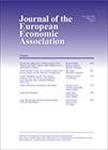-
作者:Dal Bo, Ernesto; Tervio, Marko
作者单位:University of California System; University of California Berkeley; Aalto University
摘要:We present an infinite-horizon planner-doer model of moral standards, where individuals receive random temptations (such as bribe offers) and must decide which to resist. Individual actions depend both on conscious deliberation and on a type reflecting unconscious drives. Temptations yield consumption value, but confidence in being the type of person who resists temptations yields self-esteem. We identify conditions for individuals to build an introspective reputation for goodness (moral capit...
-
作者:Fischbacher, Urs; Foellmi-Heusi, Franziska
作者单位:University of Konstanz
摘要:We present a novel experimental design to measure honesty and lying. Participants receive a die which they roll privately. Since their payoff depends on the reported roll of the die, the subjects have an incentive to be dishonest and report higher numbers to get a higher payoff. This design has three advantages. First, cheating cannot be detected on the individual level, which reduces potential demand effects. Second, the method is very easy to implement. Third, the underlying true distributio...
-
作者:Pruckner, Gerald J.; Sausgruber, Rupert
作者单位:Johannes Kepler University Linz; Vienna University of Economics & Business
摘要:Many publishers use an honor system for selling newspapers in the street. We conducted a field experiment to study honesty in this market, finding that a moral reminder increases the level of honesty in payments, whereas the same message has no effect on whether one is honest. Reminding customers of the legal norm has no effect. We argue that these results are consistent with a preference for honesty, based on an internalized social norm. Auxiliary evidence suggests that the moral message rema...
-
作者:Fellner, Gerlinde; Sausgruber, Rupert; Traxler, Christian
作者单位:Ulm University; Vienna University of Economics & Business; Philipps University Marburg
摘要:We run a large-scale natural field experiment to evaluate alternative strategies to enforce compliance with the law. The experiment varies the text of mailings sent to potential evaders of TV license fees. We find a strong effect of mailings, leading to a substantial increase in compliance. Among different mailings, a threat treatment which makes a high detection risk salient has a significant deterrent effect. Neither appealing to morals nor imparting information about others' behavior enhanc...
-
作者:Cappelen, Alexander W.; Moene, Karl O.; Sorensen, Erik O.; Tungodden, Bertil
作者单位:University of Oslo
摘要:What is the relative importance of needs, entitlements, and nationality in people's social preferences? To study this question, we conducted a real-effort dictator experiment where students in two of the world's richest countries, Norway and Germany, were matched directly with students in two of the world's poorest countries, Uganda and Tanzania. The experimental design made the participants face distributive situations where different moral motives came into play, and based on the observed be...
-
作者:Gaechter, Simon; Nosenzo, Daniele; Sefton, Martin
作者单位:University of Nottingham
摘要:We compare social preference and social norm-based explanations for peer effects in a three-person gift exchange experiment. In the experiment a principal pays a wage to each of two agents, who then make effort choices sequentially. In our baseline treatment we observe that the second agent's effort is influenced by the effort choice of the first agent, even though there are no material spillovers between agents. This peer effect is predicted by the Fehr-Schmidt (1999) model of social preferen...
-
作者:Costa, Dora L.; Kahn, Matthew E.
作者单位:University of California System; University of California Los Angeles
摘要:Nudges are being widely promoted to encourage energy conservation. We show that the popular electricity conservation nudge of providing feedback to households on own and peers' home electricity usage in a home electricity report is two to four times more effective with political liberals than with conservatives. Political conservatives are more likely than liberals to opt out of receiving the home electricity report and to report disliking the report. Our results suggest that energy conservati...


